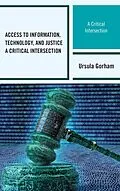Over the past fifteen years, the dramatic increase of online self-help legal re-sources, information, and tools specifically developed for use by low-income individuals without legal counsel has been promoted as one way to help those individuals who are caught in this "justice gap." Unfortunately, however, opportunities arising from the Internet and related information and communication technologies do not accrue to everyone equally as physical, intellectual, and social barriers to information persist. Access to Information, Technology, and Justice: A Critical Intersection, as the first ever book length examination of the use of technology to expand access to justice in the United States, highlights an emerging paradox wherein the technological transformation that has created an increasing array of legal self-help resources and services is also creating barriers to access for disadvantaged individuals. Those who cannot read, those who do not speak the English language, those who are unfamiliar with the law, and those with limited digital literacy skills all find themselves at a fundamental disadvantage. The legal community has only begun to examine whether these resources and services are, in fact, meeting the needs of struggling self-help users. This book builds upon existing work in this area by undertaking an in-depth exploration of how information and communication technologies are changing - and failing to change - the legal in-formation landscape for those who most need this information. Drawing upon the ongoing collaborative efforts of legal aid organizations, libraries, courts, and non-profit organizations, this book provides a framework for removing barriers to equitable access to legal information, with the ultimate goal of encouraging continued discussion and action.
Autorentext
Ursula Gorham is senior lecturer in the College of Information Studies at the University of Maryland, College Park (the iSchool). She currently serves as the director of the Master of Library and Information Science Program in the iSchool. She is admitted to practice law in Maryland and previously served as a law clerk in Maryland appellate and federal bankruptcy courts. Elizabeth (Beth) Bonsignore is an assistant research scientist at the College of Information Studies (the iSchool) and the University of Maryland's (UMD) Human-Computer Interaction Lab (HCIL). As the director of KidsTeam, an intergenerational, participatory design team at Maryland's iSchool, her research efforts involve codesign partnerships and meaningful play with youth. She has also served as an associate chair for the Association for Computing Machinery's (ACM's) Computer-Human Interaction (CHI), CHI-PLAY, and Interaction Design and Children (IDC) conferences since 2016.
Inhalt
Chapter 1: The Emergence of the Justice Gap
Chapter 2: Self-Help in the Legal Context
Chapter 3: The Expanding Role of Technology in Legal Self-Help
Chapter 4: Overview of Statewide Legal Information Websites
Chapter 5: Opening up the "Black Box" of Statewide Legal Information Websites
Chapter 6: Collaboration in the Realm of Access to Justice
Chapter 7: Recommendations for Policy and Practice
Appendix A: List of Statewide Legal Information Websites
Appendix B: Survey Questions
Appendix C: State Profiles
